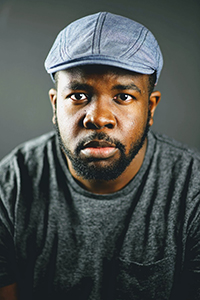
TEDxNSU 2017: STOP, DROP, and ROLL
Saturday, March 18, 2017
Noon–5:00 p.m.
NSU's Main Campus | Davie, Florida
Performance Theatre | Don Taft University Center
THEME
The TEDxNSU 2017 theme was stop, drop, and roll - simple advice we were all given as school children. But like most classroom lessons, this advice should extend beyond the boundaries of the school yard and childhood. Thoughts without action are as empty as actions without thought. We challenged our speakers to tell us how they have stopped, dropped, and rolled in their lives. What has made them pause, take stock of what's going on, then catapulted them into action? And would they do it again?
SPEAKERS FOR TEDxNSU 2017: STOP, DROP, AND ROLL
For speaker bios, visit: https://www.ted.com/tedx/events/19941
Nicholas Curci
“I am not a Survivor”
In this presentation, speaker Nicholas Curci shares his personal history as the victim of extreme adolescent bullying and social banishment. He survived the terrors of daily physical and emotional harassment and graduated from high school as a student leader and accomplished athlete determined to empower others to find their own strength amid adversity. This talk speaks to those who find themselves in a similar situation—not just behind school walls, but throughout life. Curci explores the idea that one should try to immerse themselves in the very culture that betrays them in order to learn from it and about themselves. Victims of bullying aren’t always easy to recognize. They aren’t necessarily loners, and they aren’t weird or different. They are your friends, co-workers, and family members. Regardless of who it is, if they are suffering in silence, they need to find love and respect within themselves before they can accept it from others.
Amy Daumit

“Rolling with the Punches: Be the Change that Knocks Out Domestic Violence”
As children, many of us are taught not to be difficult and to “roll with the punches.” Later in life, this metaphor describes how we’re supposed to navigate through challenging circumstances. For victims of abuse, this is both a figurative and literal concept. When you are being beaten down by someone you love, it isn’t so easy to just roll with it. This talk will explore the speaker’s story of surviving and breaking free from an abusive relationship. When she “no longer recognized the girl staring back in the mirror,” her first move was to take inventory of her life. Victims of abuse often see themselves as damaged goods, broken pieces that can’t be put back together. But, in reality, the inventory isn’t broken; it’s just in need of a thorough cleaning. This talk will prove that victims can move past both the abuse and the label of victimhood itself, revealing a life that far exceeds what once felt possible. As her own story will illustrate, Amy Daumit learned to “live with and for me,” when she realized how strong she truly is. This lesson is applicable to all kinds of challenges. We can roll with the punches, no matter what form they take, and come out of the fire burning brightly. It is only then that we can live to our fullest potential, no longer victims but survivors enjoying everything life has to offer.
Yolanda Flournah-Perkins

“Putting Out the Fire”
Nothing can inspire us to act and react quite like a fire. If you have been near an uncontrolled fire, your nerves are undoubtedly familiar with the fear and sensations associated with this sudden and growing danger. The truth is, if there’s fire, someone has likely made a poor decision. When we encounter danger in our lives—whether life-threatening or life-altering—we are forced to make split-second decisions. But even in the middle of our most frantic moments, if we can remember to follow simple rules like “stop, drop, and roll,” we can limit and eliminate the damage in our lives from making bad decisions. This talk will acknowledge that bad decisions can have detrimental and even disastrous impacts on our lives, while exploring ways to respond in troublesome situations, avoid or overcome the ramifications of such decisions, and deliver us from danger. Life is full of daily choices and new chances. So, when the world around you catches fire, react with tact.
Katie Goodroad

“Following the Goodroad and Other Great Travel Puns”
Traveling can teach you to stop showering so often, to drop anything that does not fit in your backpack, and to roll up your sleeping bag before it rains. In this talk, speaker Katie Goodroad will share the life lessons she learned while challenging her own boundaries as a traveler. Travel is not about going into a community and changing their way of life, but instead allowing a community to change you. Global experiences like studying, volunteering, and working abroad, as well as traveling locally through music and cultural events, restaurants, and local organizations can create openings for multiple realities. After four years abroad, travel taught Goodroad to STOP working to meet others’ expectation, to DROP her boundaries and learn from her surroundings, and how to ROLL her interests, passions, and desires to change the world into a future career. While all roads may not lead to the airport, all “good roads” include encouraging people to live globally.
Pratik Patel

“How to Perceive Failure in Life”
There is only one thing that makes a dream impossible to achieve: the fear of failure. But fear is not real. It is the product of thoughts we create. Moreover, when we fear failure, deep inside we know the reason behind our fear, and we avoid confrontation by diverting our thoughts. Fear of failure can actually be the best thing one can experience because it often points us to the areas we need to investigate more closely. Fear itself isn’t the problem; our reaction to our own fears is the issue. In making fear of failure an adversary, we miss the challenge of deciphering the message being sent to us. When we choose to make fear an ally, it can become useful in many ways. This talk encourages us to embrace a different perspective on fear because only by controlling emotion and letting go of negativity can one discover wisdom.
Aimee Zadak

“Metanoia: The Reality of Who We Are”
The process of understanding one’s own identity is the journey of life. The aim is to become, in the end, a conscious human. Understanding and accepting ourselves enables us to then be accepted in a world of many cultures. This process, and the internal and external acceptance that follow, requires a conscious effort and a shifting of our thoughts and beliefs. The Greeks call this shift of self metanoia, which means “to change one’s mind or perception.” Through this shift, we can discover parts of life with which we identify and feel at home. This talk will explore how to embrace this mental shift, take fragmented ideas and link them together, improve your persistence and perseverance, and communicate your clear vision of yourself. Sanchez-Zadak will discuss the process of letting go and embracing your identity and the unique role you play in the world. The speaker will share her experience of being labeled a Cuban immigrant by her American friends and a Cuban in Exile by her parents. These conflicting views brought confusion and frustration into the speaker’s childhood, when she simply wanted to belong. She later learned that a shift in her perception was necessary to move forward with her own identity.
Rosie Taylor

“Failing Forward”
As a teenager, speaker Rosie Taylor dreamed of being a bestselling novelist, teaching at a local New York college, and spending her summers traveling the world. While none of that materialized, she wouldn’t change a thing. Sometimes our big life plans go out the window, and all you can do is look fear straight in the face and forge ahead with ideas that others call downright crazy. After 50 years of putting aside conventional wisdom, Taylor learned that there’s always the opportunity to start a new chapter. Even if there’s a bear standing in the middle of the road, and you’ve got nothing but a motorcycle, you can still get closer to take a better look. Sometimes the bear you feared is even more afraid of you, and the view on the other side is worth the risk.
Alonzo Williams

“Creative Violence”
Contemporary African American culture is often misunderstood, and at times, its beauty goes unrecognized. Urban artistic expression, in particular, is often perceived as a lesser form of art when compared to more dominant, Eurocentric art forms. Through dance, literature, and photography, this presentation aims to celebrate African American culture through creative expression, rather than resorting to violence as a response to racial discrimination. From its early roots to present day, African American art has served as a tool to fight oppression and inspire social justice and reform. Multiculturalism, gentrification, and racially charged violence in America are topics at the forefront of today’s headlines and family dinner conversations. This presentation will explore these issues through art as a means to shed a positive light on the societal and political changes desperately needed to overcome America’s history of inequality.
